The Texas MBA Programs Guide: Houston vs. Dallas

If you’re looking to earn a Texas MBA, where should you go to school? Should you choose a top MBA program in Dallas or Houston? First, we need to take a look at the cities.
Living in Dallas vs. Houston
First, let’s take a look at the cost of living in Dallas vs. Houston. According to Numbeo, the world’s most extensive database containing user contributed data about cities, the overall cost of living is relatively similar: $4,242 in Houston compared to $4,000 in Dallas. Houston barely edges out Dallas with a slightly higher cost of living, and here’s how that’s broken down.
- Consumer Prices: 35 percent higher in Houston
- Rent Prices: 7.30 percent higher in Houston
- Restaurant Prices: 27 percent higher in Houston
- Groceries Cost: 95 percent higher in Houston
- Local Purchasing Power: 26 percent lower in Houston
Other things to consider when choosing between Dallas and Houston include:
- Industries
- Houston is known for being the oil capital and is an ideal location for jobs in the energy industry.
- Dallas, on the other hand, is known for real estate (Tramelle Crow is headquartered here), as well as hedge funds and asset management firms.
- Economic Development: According to Site Selection Magazine, Houston and Dallas are comparatively equal when it comes to economic development, ranking second and third respectively.
- Top Companies: Houston edges out Dallas for being home to more Fortune 500 companies. In fact, Houston is home to 27 top companies compared to 14 in Dallas. However, they rank second and third respectively.
However, according to Forbes, “while Houston and Dallas have decent amenities (and having better ones surely wouldn’t hurt), they aren’t places that offer a unique lifestyle brand, such as charming architecture or a cutting-edge arts scene.”
Texas MBA Programs
The next step is to compare the top three MBA programs in each city. In particular, we wanted to take a look at the tuition rates (two years), GMAT averages, and post-graduation salaries at each program in each city to get a well-rounded picture.
Overall, there are a few things to note right away.
- The top full-time MBA programs in both cities are ranked well. However, Houston programs tend to rank higher on major ranking sites such as The Economist and Bloomberg Businessweek.
- Houston tends to be more expensive regarding tuition ($93,052 vs. $69,191), but it also pays a higher salary ($110,000 vs. $92,000). This balances out with around a $25,000 difference in tuition and a $20,00 difference in post-graduation salary.
- Finally, GMAT averages for class profiles tend to be higher in Houston as well (688 vs. 660).
Here’s how it all breaks down per school.
Top 3 Houston MBA Programs
McCombs School of Business – University of Texas at Austin
The McCombs School of Business offers a full-time MBA, an Evening MBA, a Weekend MBA, and an Executive MBA program. And it’s considered one of the top business schools in the country, consistently ranking highly on various lists, including ranking 28 according to The Economist.
- Tuition Rates (two years): $91,000
- GMAT Averages: 703
- Post-Grad Salaries (Mean): $117,068
Rice University – Jones Graduate School of Business
The Jones Graduate School at Rice University offers a full-time MBA program, an MBA for Professionals (part-time), and an Executive MBA Program. The school’s full-time MBA program ranked 10th on the Bloomberg Businessweek list in 2017.
- Tuition Rates (two years): $116,000
- GMAT Averages: 711
- Post-Grad Salaries (Mean): $112,158
Mays Business School – Texas A&M University
The Mays Business School has both a full-time MBA program as well as a part-time Professional MBA program. In addition, the school offers an Executive MBA. In 2017, The full-time MBA program ranked 20th overall by Forbes, and 22nd overall by Bloomberg Businessweek.
- Tuition Rates (two years): $72,158
- GMAT Averages: 649
- Post-Grad Salaries (Mean): $103,299
Top 3 Dallas MBA Programs
Naveen Jindal School of Management – University of Texas at Dallas
The Naveen Jindal School offers a full-time MBA, part-time Professional MBA, Executive MBA, and Global Leadership Executive MBA program. The full-time MBA is well ranked according to the U.S. News & World Report, ranking 16th among public university programs in the U.S.
- Tuition Rates (two years): $27,603
- GMAT Averages: 678
- Post-Grad Salaries (Mean): $86,644
Cox School of Business – Southern Methodist University
The Cox School of Business at SMU offers a full-time MBA, Fast Track MBA, Professional MBA (part-time), and an Executive MBA program. Most recently, SMU Cox achieved its first Financial Times ranking at 91st.
- Tuition Rates (two years): $91,952
- GMAT Averages: 661
- Post-Grad Salaries (Mean): $96,587
Neeley School of Business – Texas Christian University
At the Neeley School of Business at TCU, MBA applicants can apply to the full-time MBA, Accelerated MBA, Professional MBA (part-time), Accelerated Professional MBA, or MBA for Energy Professionals program. The Economist ranked the Neeley School MBA ranks 61st overall on its most-recent ranking.
- Tuition Rates (two years): $88,020
- GMAT Averages: 640
- Post-Grad Salaries (Mean): $93,010
Dallas vs. Houston Breakdown in Charts
When breaking down the data between MBA programs in Dallas and Houston, here’s what it looks like:
Texas MBA Tuition
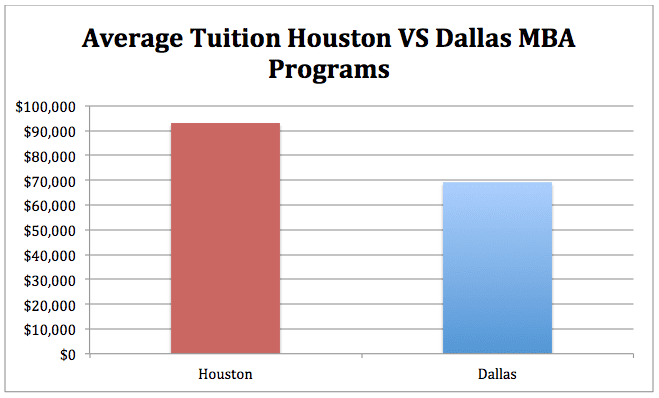
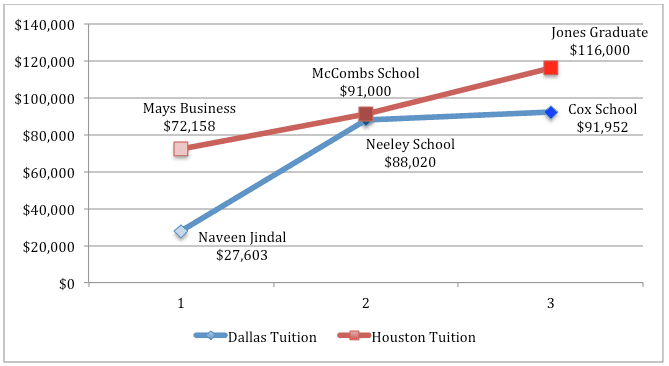
Texas MBA GMAT Averages
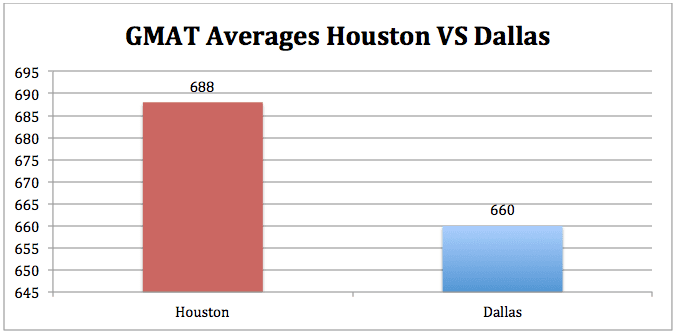
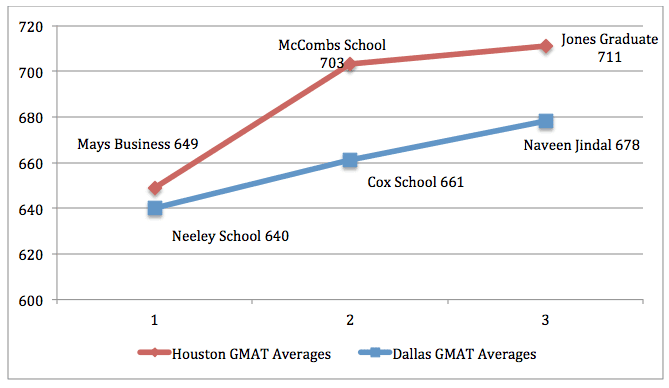
Texas MBA Post-Graduation Salaries
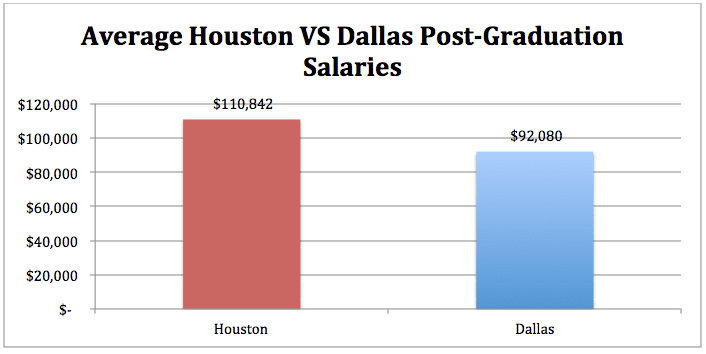
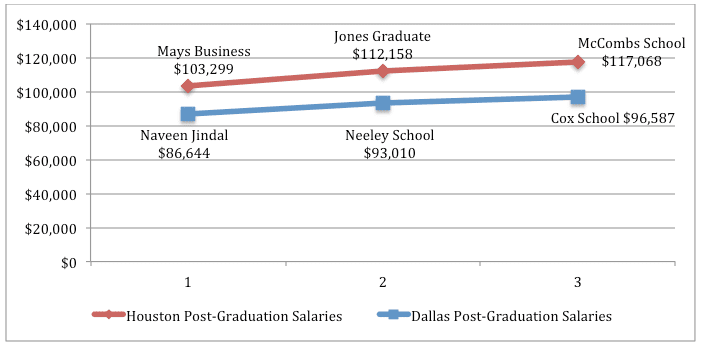
What Are The 5 Highest Paying Consulting Firms in the World?

“Is this going to be worth it?”
If you are currently or have ever considered earning an MBA degree, it’s likely that you’ve asked yourself this question. Given the burgeoning cost of tuition—especially for top business programs—plus the loss in income and cost of living while pursuing your education, it’s a fair question to ask. Does it make sense to invest this sort of money into your education with no guaranteed result?
Of course, many of the benefits of earning an MBA simply can’t be quantified and boiled down to raw numbers. The new opportunities created through study abroad or case competitions, the expansion of your professional network and chance to connect with industry professionals. All of these considerations can make it difficult to ever truly gain perspective on an MBA degree’s worth.
Thankfully, there are some areas where the numbers still do the talking. In particular: post-graduate salary. This is one of the easiest and simplest ways to see the true value of an MBA. And it’s not just helpful to look at the increase in salary after earning an MBA—it can be just as enlightening to see the difference in post-graduate salary for various MBA concentrations. This data can help you make important choices about what kind of path you’d like to pursue while earning your MBA, and how to make the most out of the time and money spent on your education.
U.S. News & World Report found found that strategy, while one of the least popular MBA concentrations (chosen by just 4.3 percent of business school students), led to some of the highest paying jobs after graduation. Since students concentrating in strategy typically go into jobs at consulting firms following graduation, they are more likely to earn high salaries that can help increase the overall value of their degree—not to mention pay off their student loans much faster.
For students looking to increase the worth of their MBA with a high-paying job in consulting, we’ve rounded up the highest paying firms in the consulting industry. Working towards careers in these top companies will guarantee that the answer to “is this going to be worth it?” will always be “yes!”
The 5 Highest Paying Consulting Firms

Formerly known as Ernst & Young, EY-Parthenon is one of the top paying consulting firms for MBA graduates. The company is headquartered in London, England, with more than 250,000 employees at offices throughout the world. EY is known as one of the “Big Four” accounting firms, joining Deloitte, PwC, and KPMG as the four largest professional services networks in the world. Last year, EY was also named 29th on the “100 Best Companies to Work For” list from Fortune.
According to Business Insider, EY-Parthenon employees with just an undergraduate degree make up to, on average, $110,000 annually, including base salary, signing bonuses, and extra incentives. Management Consulted data found that MBA grads earned an astounding base salary of $170,000 at the company. That figure doesn’t include signing bonuses, relocation expenses, and more.

Founded in 1926 by University of Chicago economics professor James McKinsey, McKinsey & Company has transformed into one of the world’s most iconic consulting empires. The company has opened in more than 120 global cities, employing more than 14,000 consultants—many of which comes from prestigious MBA institutions.
According to Management Consulted data, McKinsey & Company is the second-highest paying consulting firm in the world for MBA grads, with offered base salaries coming in at $152,000. With an added potential performance bonus of $35,000, those figures can rise to $187,500 in just one year.

Strategy& has grown exceedingly since its beginnings as Booz & Company in 1914. One of the top global strategy consulting firms in the country, the company now has 57 offices throughout the world, revenue upwards of $1.3 billion, and 3,000 employees. Nearly a century after their founding, in 2013, the company was acquired by PricewaterhouseCoopers (PwC) and officially renamed to Strategy&.
The company comes in third overall among for annual base compensation for MBA grads, at a lofty $152,000. The company also offers one of the most unique and lucrative retirement funding options for consulting employees, with 6 percent of base salary and bonuses matched for its 401k plan.

L.E.K. is technically the youngest company to make the top five, which was founded in the early 1980s by former Bain partners James Lawrence, Iain Evans, and Richard Koch. Headquartered in both Boston and London, L.E.K. is also the smallest company on this list, with around 3,000 employees.
Despite its size and relative newness in comparison to many of the other companies on this list, L.E.K. pays its employees more-than-handsomely, offering a tempting base salary of $150,000 and upwards of $25,000 in performance-based potential incentives.
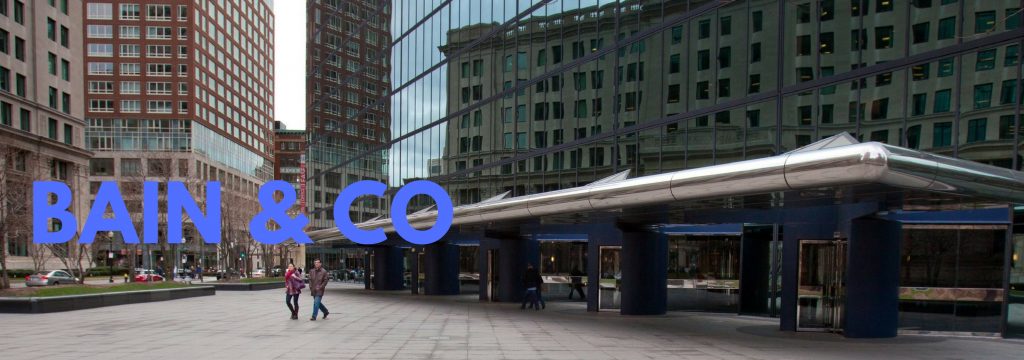
Bain & Company, headquartered in Boston, Massachusetts, is a global management consultancy firm providing advice for public, private, and non-profit organizations. Along with the Boston Consulting Group and McKinsey & Company, Bain & Company is one of the “Big Three” firms. Founded in 1973, Bain & Co. today has more than 8,000 employees throughout the world and an estimated revenue between $3.7 and $4.5 billion.
Bain offers its recently employed MBA grads a starting base salary comes in slightly above aforementioned Deloitte employees, snagging $148,000 per year, which can grow to $185,000 in total compensation.
Honorable Mentions

The Boston Consulting Group, founded in 1963, now has more than 90 offices in 50 countries, advising clients throughout the private, public, and not-profit sectors.
The Massachusetts institution offers its MBA graduates right around the same compensation as Bain & Co, the companies unofficial direct competitor. Base salaries come in around $147,000, but massive (and we mean massive) bonus incentives can bring that total up to $191,100.

Another one of the “Big Four,” Deloitte has witnessed non-stop growth since its founding in 1845. Today, the firm makes more than $38.8 billion USD in revenue with roughly 263,900 employees throughout the world. As of 2016, Deloitte was ranked as the sixth largest privately owned organization in the U.S. The firm’s offerings span across audit, tax, consulting, financial advisory, and enterprise risk services, with offices across the world in cities like Los Angeles, Tokyo, Madrid, Tel Aviv, and many more.
Management Consulted data found that MBA grads at Deloitte reported a base salary slightly smaller than its aforementioned contemporaries, pulling in $140,000 per year. Deloitte separates itself from its competition by offering returning interns a potential to pay for the send year of their MBA education in the form of reimbursement.
How Can You Score a Job at Salesforce with an MBA?

Salesforce, one of the country’s highest valued cloud computing companies, is actively looking for promising MBA graduates, offering diverse opportunities in tech, business, and sales. Since it’s founding in 1999, Salesforce has been growing wildly, becoming the first enterprise cloud company tor each $10 billion in revenue as of August 2017. And Salesforce isn’t just remarkable for its product’s success—the company was also rated as the “#1 Best Company to Work For” by Fortune.
The Salesforce culture is centered around the idea of “Ohana” (Hawaiian for “family”), and earned its place at the top of the list by offering incredible benefits to its employees—both monetary and mentally. It’s understandable why MBA’s would want a job at Salesforce Ohana, with their focus on helping strong performers find new challenges and opportunities for growth.
What Does Salesforce Look for in New Hires?
Salesforce makes recruiting a priority at every level through their Futureforce University recruitment program. Salesforce offers new hires the same incredible opportunities available to all of their employees—seven days of paid time for volunteering, networking opportunities, and access to the Executive Lunch & Learn and Speaker Series that puts interns and new hires in direct contact with Salesforce leadership.
Because of Salesforce’s focus on having their employees give back to their communities, they seek out new hires who have made a demonstrated impact within their past efforts, whether at school or professionally. In 2015, Salesforce’s senior vice president of global recruiting, Ana Recio, commented on the different ways applicants could make themselves stand out.
“What did you do to differentiate your job from others?'” she said. “What was your absolute impact, your legacy? We always look for people who truly were kind of thought leaders and change agents.”
How to Get Your Foot in the Door?
MBA graduates and current students can apply directly for open roles. Current students will most directly benefit from the company’s MBA internship: a 12-week program that students can pursue during the summer in between years one and two of their program. Each summer, MBA interns are hired in the fields of product marketing, product management, CSG business analyst, corporate development, and data analytics. If recruiters think there might be a good fit, applicants will likely be given a 30-60 minute phone screening, followed by an interview with a hiring manager. Before offering the position, MBAs will likely have to partake in a panel interview/case study, presenting their professional and academic accomplishments.
Salesforce also recruits recent graduates (those who graduated in the last 12 months) in the fields of tech, sales, and business. The precise roles and interview process for each varies depending on the field.
How Well Does a Job at Salesforce Pay?
The majority of hires at Salesforce, both full-time and interns, are for tech-centric positions. However, the company does offer supreme compensation for those with business degree backgrounds—especially those with an MBA.
According to Payscale data, MBA graduates wit a job at Salesforce earn between $85,000 and $160,000 USD annually.
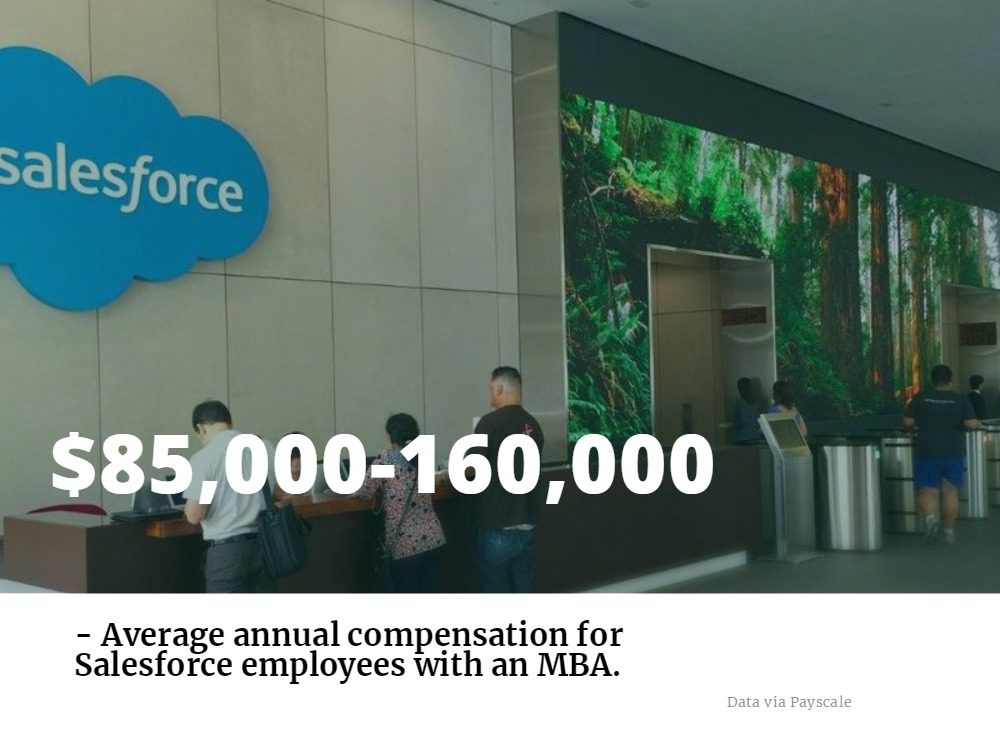
It’s no secret that one of the reasons Salesforce tops the Glassdoor list of “Best Places to Work” is the compensation. Although, as with any position, salary will vary depending on a number of factors, Glassdoor’s compensation of full-time employees shows a lower-end salary range of $60,000-80,000 annually (for account executives and sales engineers) and upwards of $141,000 for senior engineer positions.
What Do Current and Former Salesforce Interns Think?
Danielle, who interned with Salesforce as a product marketing MBA intern, commented on her work experience and Salesforce’s company culture in this video. “Not only am I working on independent projects as part of the internship, but I’m also shadowing people in my team and really seeing what a true day in the life is for a project manager within the app cloud,” Danielle said. “Other internships are very focused on their projects and feel very siloed but here at Salesforce I’m really able to be integrated with the team as a whole.”
Eamon, a software engineer who began at Salesforce as a recent graduate, also commented on his experience. “As a new grad what’s interesting is there really is no pathway you’re supposed to follow, it’s what you make of it,” he said. “It’s the people you go out of your way to meet, the experiences you make, the projects you decide to take on.”
Caught: Why Business Schools Might Lie to Improve Rankings

School rankings from sites like Forbes or U.S. News & World Report are often a crucial factor for students before they decide where they should pursue a degree. Using a combination of rankings, standardized test scores, job placement after graduation, and tuition costs, among other crucial factors, a school ranking a quick and succinct look at the relative merits and weaknesses of MBA programs throughout the country—and the world.
There is a lot riding on these rankings: not only do perspective MBAs often make decisions about where to pursue their degree based on these reviews, but graduates can use these rankings to demonstrate the quality of their degree to future employers. With such high stakes, organizations like U.S. News that compile these rankings rely on the accurate reporting of data from each business school.
So, what happens if the information is inaccurate, or worse? Data like student satisfaction and post-graduate salary—which can be so crucial in informing a prospective MBAs choice of school or program—is reported directly from the business schools, which often presents a conflict of interest potential. With so much at stake, would a school ever lie to increase their spot in the ranking?
Unfortunately, it seems the answer is yes. Just last week, the Online MBA program at Temple University’s Fox School of Business—a program that was consistently ranked in the top spot in U.S. News’ Online MBA ranking—vanished from the list. According to the initial announcement, new information had revealed that just 20 percent of Fox students in the Online MBA program had actually submitted test scores, a number that had initially been reported at a perfect 100 percent. Since the formula used by U.S. News weighs test score averages more if over 75 percent of students have submitted them, this inaccurate reporting from Temple Fox would have given the program an undeserved boost in the school ranking.
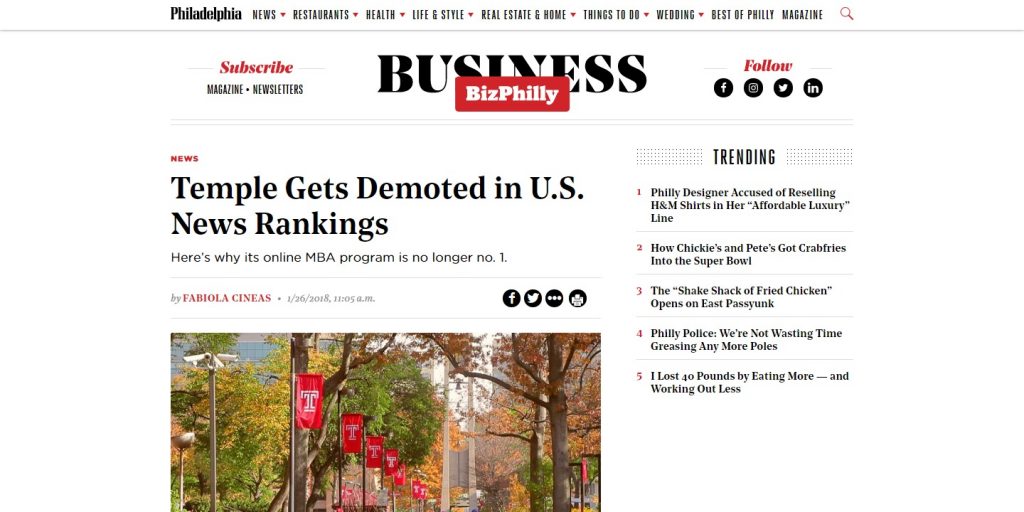
In the wake of Temple’s removal, questions continue to arise about the lengths schools go for good rankings/Photo via PhillyMag.
In the days since the initial announcement of Temple’s removal from the ranking, even more questions came out regarding the accuracy of Fox’s data. Further investigation found that Temple had reported 100 percent of students taking standardized admissions test for every year since 2014—a suspicious jump from the 25 and 33 percent that had been reported in the years prior. Since the test scores data submitted turned out to be inaccurate, it seems wholly possible that the data had also been misreported for the three years prior; the same years that Temple Fox held the top ranking for Online MBA programs.
This isn’t the first time it’s been discovered that business schools and even undergraduate programs have falsified or reported inaccurate data to boost its rankings. In 2013, Forbes was forced to remove four schools from its ranking of “America’s Best Colleges” due to inaccurate reporting: doctored SAT results from Bucknell University, false acceptance and graduation rates from Iona College, among others. In 2012, George Washington University lost its ranking on U.S. News’ “Best Colleges” list when it was discovered they were inflating the high school grades of their incoming students.
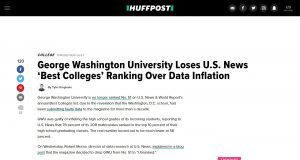
GWU was one of several schools in the past few years to submit false data for a rankings boost/via Huffington Post.
The problem may be even more far-reaching than some may suspect. In 2013, a survey of 576 college admissions officers found that 91 percent believed other colleges to be guilty of falsely reporting their admissions data. Even the school ranking creators themselves are shocked by this trend. In 2013, U.S. News editor Brian Kelly commented, “The integrity of data is important to everybody … I find it incredible to contemplate that institutions based on ethical behavior would be doing this.”
In 2005, the Association to Advance Collegiate School of Business (AACSB) took a deep look into this trend to examine why the issue of falsifying business school data might be so widespread. “Because rankings of full-time MBA programs are commonly presented under the label of ‘best b-schools,’ the public has developed a narrow definition about the breadth and value of business education,” the report states. Since most media rankings don’t consider factors like faculty research or doctoral education, MBA programs have become more likely to invest in more visible aspects of the program, such as facilities and marketing campaigns, which don’t actually deal with the quality of the degree. As a result, even high-quality programs may earn a lower media rank than they deserve based on the factors considered, adding pressure to do what it takes to earn a school ranking that matches what they perceive as the quality of the degree.
“Plenty of people apply to a school because it has reached the summit of a ‘best-of’ ranking, just as many people will see a movie or buy a book after it wins an award. That’s human nature,” Columbia Business School dean Glenn Hubbard told Fortune. “We want to experience the best.”
Whether or not placement in a school ranking truly represents the quality of a degree, it’s easy to see why the pressure is on for many admissions departments. A better school ranking can increase the number of applicants, providing for a more competitive, and diverse applicant pool, which creates a better quality admitted class. The cycle continues: success of these graduates can improve the possibility of future funding, providing more resources for the program and encouraging even more applicants to apply down the line.
“Rankings have become omnipresent in higher education, and they have enhanced the competition among institutions,” said Terry W. Hartle, senior vice president at the American Council on Education, in 2013. “And in any highly competitive environment, there is always a temptation to cut corners.”
For now, the Fox School of Business has been removed from the U.S. News Online MBA ranking. Concerns about false data continue to be evaluated, as organizations like AACSB continue to seek solutions and make recommendations for best practices when it comes to the collection and reporting of admissions data. In 2017, the AACSB publication “On Academic Rankings, Unacceptable Methods, and the Social Obligations of Business Schools,” suggested that schools and organizing bodies work together to find a method of data collection that includes “transparency, interpretability, and the empowerment of individual decision makers by whatever criteria truly suits their individual needs.”
For prospective students, its important to acknowledge this troubling but widespread trend as they make important decisions about where to earn a degree. While school ranking remains an easy way to compare programs against each other, students should consider not just the accuracy of the data but also the kind of factors reported in media rankings. While it seems possible that the number one program in a media ranking may not truly deserve that position, the real top program- the best for each individual’s needs and career goals—will always deserve first place.
Start Your Career at KPMG with an MBA

Those of you who actively watch the stars and skies might not be surprised by the parallels between the business universe and our actual cosmos.
How To Break Into the Tech Industry: Intuit Inc.

Since 1983, Intuit Inc.—the Mountain View, CA software company that spearheaded the creation of products like TurboTax, Quickbooks, and Mint—has effectively changed the way the average person manages their money. And with more and more MBAs shedding their finance industry aspirations for a role in tech, a job with one of the most well-regarded tech organizations is looking especially ideal.
Why Should I Join Intuit Inc.?
Intuit Inc. was ranked 13th overall on Fortune’s 2017 list of the “100 Best Companies to Work For,” and 30th overall on Glassdoor‘s newest “Best Places to Work” list. The company takes a holistic approach to ensuring company well-being. Intuit has 24-hour onsite gyms, and even provides a certain amount of bicycles for employees who bike to work. Fortune listed job perks like telecommuting, compressed work weeks, college tuition reimbursement, daily free time to pursue other projects, and paid time off for volunteering.
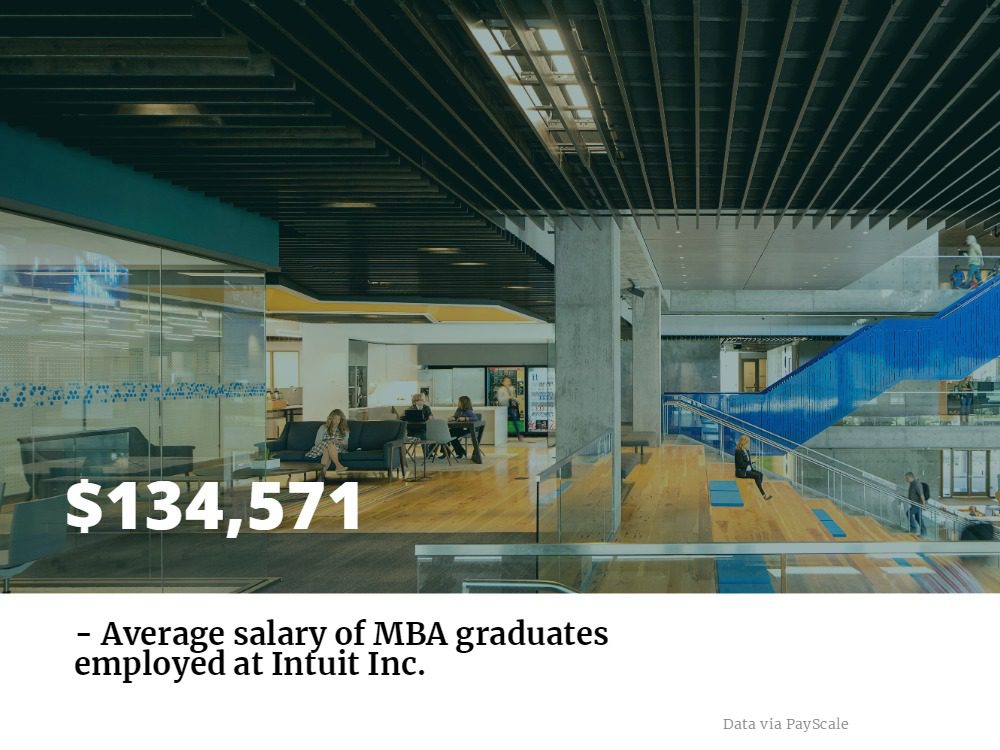
Many of the positions at Intuit are, unsurprisingly, tech-based, so an MBA may not be as advantageous in getting an engineering position. However, according to PayScale data, MBAs are typically the highest earners at Intuit, with the average MBA earning nearly $125,000 per year.
What Internships are Available?
Intuit Inc. has a specific internship for MBAs: the MBA Intern Marketing Manager position. This internship is offered in Intuit’s California locations in Mountain View and San Diego, as well as in Plano, Texas. In this position, MBAs help the company gain insight into the needs of customers and the effectiveness of current marketing strategies, through research and testing. According to the company website, these interns also have the opportunity to partner with teams working in, “Product Management, Development, Finance and Care.” This is a paid summer internship, so students can cover the cost of living while observing and contributing to innovations at a leading software company.
Intuit is currently offering a variety of other internship positions that might be appropriate for MBAs, such as a Marketing Intern position in London. MBAs specializing in Supply Chain Management can apply to be Supply Chain Specialist Interns, and work closely with Intuit’s Supply Chain Finance team.
At the company, it is not uncommon for intern’s to parlay their positions into full-time jobs after graduation. The company’s website says that its internship program, “is truly an ‘early identification’ program, focusing on identifying and investing in high potential university students really to encourage them in their early careers and potentially to bring their talent back to Intuit after graduation.”
How to Get Hired at Intuit
In recent years, Intuit has moved from a traditional interview process, to an innovative method of vetting candidates that incorporates virtual reality. Their hiring program, Assessing for Awesome (A4A), requires that candidates: “Speak for five minutes about themselves; speak for 15 minutes about two or three projects of which they’re proud; prepare a 15-minute presentation on a case study or coding exercise; participate in a 25-minute question and answer period.” The interview is conducted by an advanced staff member who works closely with the position in question. The company uses virtual reality to allow candidates to demonstrate their skill sets.
Intuit Inc. hires graduates and interns from a number of the top-rated business programs in the country, including the Northwestern University Kellogg School of Management in Chicago, Illinois, which brought in full-time employees and interns from the most recent graduating class. Some of the most highly-regarded MBA programs offer various tech industry advantages, including the recently introduced Tech MBA at NYU Stern, and the promising new Cornell Johnson Tech MBA, offered at the school’s new New York City campus.
For more information on which school’s provide the best opportunities to join the tech industry, head on over to our sister site Clear Admit, which recently took a look at programs from other established institutions like the UCLA Anderson School of Management and MIT Sloan.
